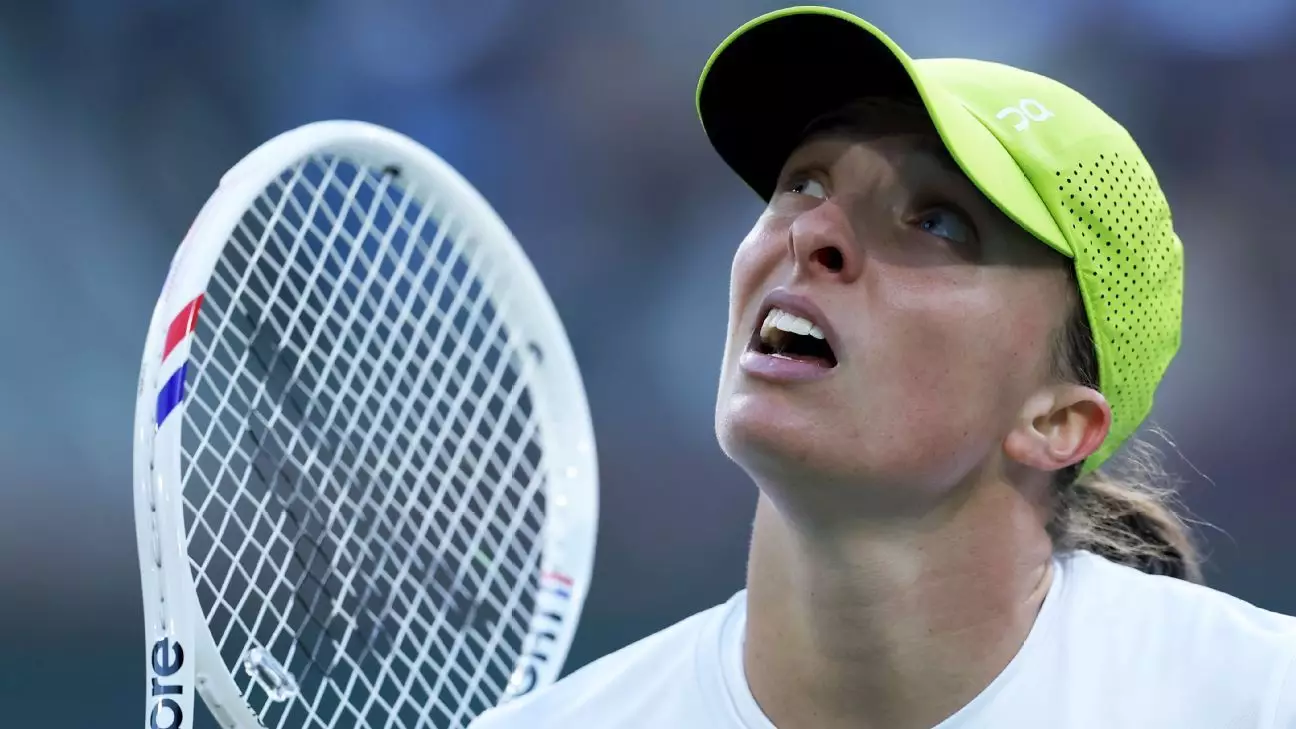In the high-stakes world of professional tennis, athletes are often expected to embody a façade of invincibility, pushing through physical barriers while maintaining a polished public persona. However, Iga Swiatek, a five-time Grand Slam champion, recently vulnerably peeled back the layers of her emotional state, revealing her struggles that often go unnoticed in the public eye. Through an honest and introspective social media post, Swiatek has elucidated her mental health journey marked by a recent doping suspension and the profound personal challenges that transpired while grappling with the pressures of competition.
The Polish star’s candid reflection started with an unsettling admission: a period of three weeks consumed by daily tears. This raw vulnerability confronts the stigma surrounding mental health in athletics, where emotional expression is sometimes misconstrued as weakness. Swiatek’s willingness to unravel her experiences appears to herald a much-needed shift in the narrative around athletes’ mental states—transitioning from the idea that showing vulnerability is a flaw to embracing it as an essential part of the human experience.
Confronting Public Scrutiny and Misinterpretation
Swiatek’s revelations aren’t merely personal reflections; they are also a critique of the relentless judgment that athletes face in the digital age. Following an incident where her frustration led to an errantly hit ball almost striking a ball boy, she was met with a wave of harsh criticism. In her post, Swiatek expressed bewilderment at the critical response to her emotional outburst. “My intention was never to aim the ball at anyone,” she noted, emphasizing the human propensity for frustration under pressure.
This incident speaks volumes to the double standards athletes often encounter. Swiatek highlighted the inconsistencies in public perception—when athletes display stoic resilience, they are dubbed “robots,” yet when they show vulnerability, they are chastised for immaturity. This cyclical judgment creates an impossible standard for emotional expression, one that does not account for the inherent pressures of professional sports. An athlete’s journey transcends mere technical prowess; it weaves a narrative filled with highs, lows, and everything in between.
The Weight of Expectations and Past Failings
Furthermore, Swiatek’s acknowledgment of her doping suspension adds another layer to the complexity of her experience. Despite being cleared of intentional wrongdoing, the shadow of the incident undoubtedly loomed over her, exacerbating the pressure she felt. The mental toll of such scrutiny can be debilitating, and her honesty about the agonizing second half of last year reveals a stark truth often ignored: even champions are not immune to the frailties of the human condition.
Also notable is Swiatek’s reflection on the toll competition can take—how it once felt as if her career was teetering. Her openness about emotional strife counters the notion that success equates to a linear path free of obstacles. The realities of elite sport, laden with expectation and public interest, often demand a resilience that can be overwhelmingly lonely. The insight that Swiatek provided manifests as a reminder that behind the accolades lies a person struggling to define success and manage mental clarity in a fiercely competitive arena.
A Shift in the Narrative: Embracing Authenticity
As Swiatek navigates her career, her discourse challenges the traditional athlete stereotype by advocating for a more authentic portrayal. Encouraging her peers and fans to embrace emotional honesty helps dismantle the stigma surrounding mental health struggles in sports. By bravely sharing her experience, Swiatek has become more than a champion on the court; she has become a beacon of hope for those grappling with their emotions in high-pressure environments.
Moving forward, it is crucial for the sports community to foster environments that acknowledge emotional health as a pillar of athletic success rather than a weakness to be hidden. Athletes like Swiatek are laying the groundwork for a narrative where vulnerability is not merely accepted, but celebrated. Letting go of the facade of perfection allows for more authentic connections with both fans and fellow players—transforming the landscape of how sports are perceived and how athletes pursue their passions.
Swiatek’s journey offers much more than insight; it serves as a testament to the power of resilience and the importance of embracing one’s emotional complexity. Through her voice, we are reminded that it is acceptable to struggle and that even the best can feel lost at times. It is this very spirit of authenticity and vulnerability that might just redefine what it means to be a successful athlete in the modern era.

